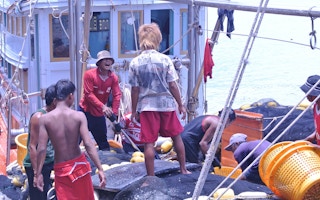Thai fishing boat owners who trap workers on board ships and withhold wages often do not realise that is modern slavery, so authorities must ramp up their policing efforts, advocates say.
Research shows many fishing operators are oblivious that the grim conditions on board their ships amount to forced labor, according to a recent report.
Many operators know smuggling people across borders and forcing them to work at sea for long periods of time is wrong but see withholding documents or forcing them to pay off debts as acceptable, said the report by Issara Institute, a Bangkok-based anti-trafficking organisation.
Thailand’s multibillion-dollar seafood sector has been the target of scrutiny in recent years following investigations that found slavery, trafficking and violence on fishing boats and in onshore processing facilities.
“Vessel owners exploit fishermen yet view themselves as benevolent patrons,” said the report, released last month, based on interviews with 75 Thai captains and large fishing boat owners.
The findings show a need for stronger efforts to improve the working conditions and bring the fishing industry in line with anti-trafficking laws, advocates said.
“It’s all going to come down to enforcement,” Brad Adams, Asia director at Human Rights Watch, told the Thomson Reuters Foundation.
The military government in Thailand has rolled out industry reforms since the European Union in 2015 threatened to ban its fish imports, but little has changed, Human Rights Watch said in a report also released last month.
Shawn MacDonald, chief executive of Verite, a charity fighting labor injustices, said the Issara findings provide insight useful for crafting incentives against forced labor.
“It’s really important that we understand their perspective so we can pull the right levers,” he said.
The world’s third largest seafood exporter, Thailand’s fishing industry employs more than 300,000 people.
About 25 million people globally were estimated to be trapped in forced labor in 2016, according to the International Labour Organisation and rights group Walk Free Foundation.
This story was published with permission from Thomson Reuters Foundation, the charitable arm of Thomson Reuters, that covers humanitarian news, women’s rights, trafficking, property rights, climate change and resilience. Visit http://news.trust.org.










